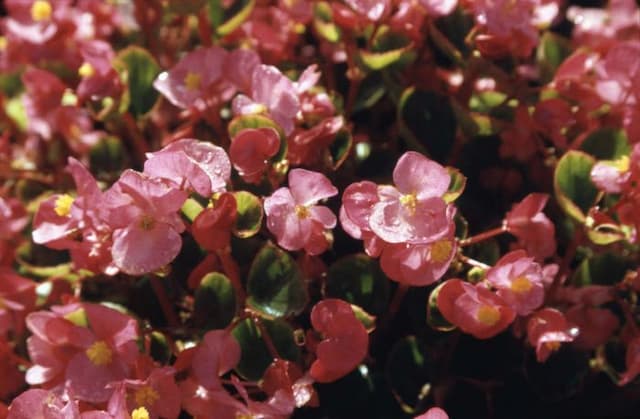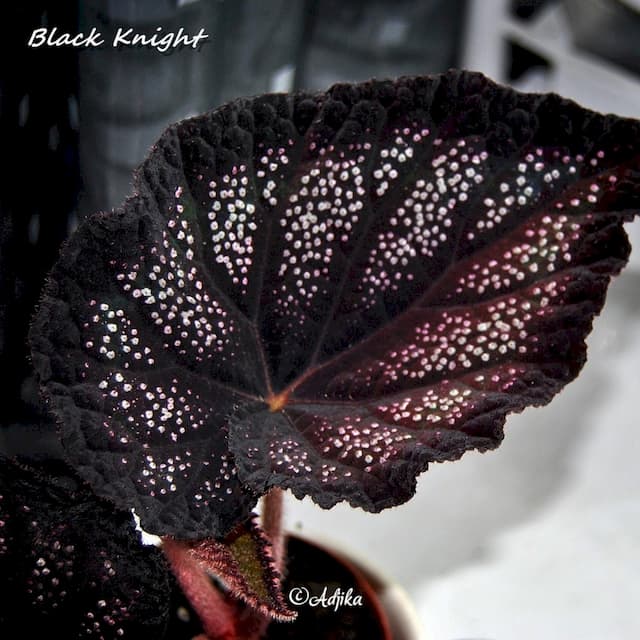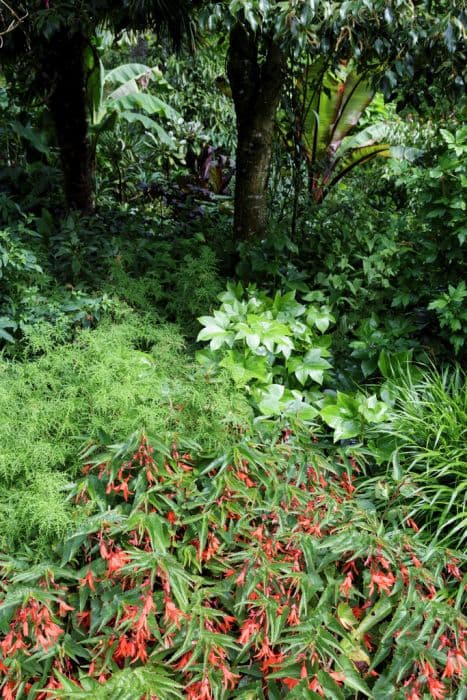African Jungle Begonia Begonia 'African Jungle' (PBR) (R)

ABOUT
The Begonia 'African Jungle' is a striking and ornamental houseplant, known for its distinctive foliage. It features lush, vibrant leaves that are typically dark green in color, often with a unique metallic sheen that can catch the light beautifully. The texture of the leaves is another notable characteristic; they can be quite thick and fleshy, giving them a robust and hearty appearance. Each leaf is adorned with intricate patterns that can range from lighter green to almost silvery in color, creating a lovely contrast against the darker green backdrop. The leaves may also display a red or purplish underside, further enhancing the visual interest of the plant. This striking coloration makes the Begonia 'African Jungle' an attractive choice for those seeking to add a touch of the exotic to their interior spaces. Overall, the Begonia 'African Jungle' exudes a wild, tropical charm, bringing a sense of verdant lushness that is typically associated with dense, untamed forest environments.
About this plant
 Names
NamesFamily
Begoniaceae
Synonyms
African Jungle Begonia
Common names
Begonia 'African Jungle' (PBR) (R)
 Toxicity
ToxicityTo humans
Begonias, including the Begonia 'African Jungle', contain compounds that may cause irritation or discomfort if ingested. The primary irritants are oxalate crystals, which can lead to symptoms such as a burning sensation in the mouth, lips, tongue, and throat. Swelling of the oral tissues, difficulty swallowing, and stomach upset are possible after consuming parts of the plant. In most cases, the symptoms are mild, but it's important to seek medical attention if they occur.
To pets
Begonias, like the Begonia 'African Jungle', can also be toxic to pets if ingested, primarily due to the same oxalate crystals found in the plant. These can cause oral irritation, excessive drooling, vomiting, and difficulty swallowing in animals. The reaction may vary based on the amount ingested and the pet's size, age, and overall health. If you suspect your pet has ingested begonia, consult a veterinarian to manage the symptoms and ensure their well-being.
 Characteristics
CharacteristicsLife cycle
Perennials
Foliage type
Evergreen
Color of leaves
Mixed
Height
1-2 feet (30-60 cm)
Spread
1-2 feet (30-60 cm)
Plant type
Herb
Hardiness zones
10
Native area
Africa
Benefits
 General Benefits
General Benefits- Ornamental appeal: The Begonia 'African Jungle' offers striking foliage that adds aesthetic value to any setting.
- Easy to care for: This plant is relatively low-maintenance, making it suitable for beginners or those with busy lifestyles.
- Versatility: It can be grown indoors as a houseplant or outdoors in containers or flower beds, given appropriate climate conditions.
- Long blooming period: It often features a lengthy blooming season, providing consistent color and interest.
- Enhances mood: The presence of houseplants like the Begonia 'African Jungle' can contribute to a feeling of well-being and comfort in a home or office.
- Great for shady areas: This variety of Begonia does well in shade gardens where other plants might not thrive.
 Medical Properties
Medical PropertiesThis plant is not used for medical purposes.
 Air-purifying Qualities
Air-purifying QualitiesThis plant is not specifically known for air purifying qualities.
 Other Uses
Other Uses- Container Gardens: Begonias are excellent choices for container gardens due to their compact size and colorful foliage. They can add visual interest to patios or balconies.
- Shade Gardening: Begonias thrive in shaded areas where many other plants struggle, making them an ideal choice for shady garden corners.
- Texture Contrast: Due to their unique and varied foliage, begonias offer great opportunities to create contrast in texture when planted alongside smoother-leaved plants.
- Terrariums: Begonias can be grown in terrariums where their humidity needs are met and their lush foliage can be enjoyed up close.
- Fairy Gardens: The small and intricate leaves of begonias are perfect for creating a magical fairy garden setting.
- Bonsai: While not a traditional bonsai plant, begonias can be pruned and trained into miniature tree forms.
- Office Plants: Begonias are suitable for office environments where their easy care and lower light requirements can be accommodated.
- Bouquets and Arrangements: Begonia flowers and leaves can make unique additions to floral arrangements or bouquets.
- Landscape Borders: Begonias can create colorful and dense borders for garden paths or flower beds.
- Water Gardens: While not aquatic, begonias can be grown in containers around the edges of water gardens where moisture levels are high.
Interesting Facts
 Feng Shui
Feng ShuiThe Begonia is not used in Feng Shui practice.
 Zodiac Sign Compitability
Zodiac Sign CompitabilityThe Begonia is not used in astrology practice.
 Plant Symbolism
Plant Symbolism- Caution: Begonias are often interpreted as a sign of caution or warning, suggesting that one should tread carefully in a situation.
- Gratitude: They can also represent deep appreciation and gratitude, making them a good choice for gifts to say "thank you."
- Individuality: With their unique appearance, begonias can signify individuality and the importance of standing out from the crowd.
- Fanciful Nature: The exotic look of Begonia 'African Jungle' suggests a fanciful nature and can inspire creativity and imagination.
 Water
WaterFor the Rex Begonia, water when the top inch of soil feels dry to the touch, typically once a week, but adjust depending on humidity and temperature. Use room-temperature water and aim for the soil, not the leaves, to prevent disease. A moderate amount of water is required, approximately 8-12 ounces, to ensure the soil becomes evenly moist but not waterlogged. During winter, reduce watering to every other week, and always provide proper drainage to avoid root rot.
 Light
LightRex Begonias prefer bright, indirect light away from direct sunlight which can scorch their leaves. The best location is near a window with diffused light or a spot receiving filtered morning sun followed by shade in the afternoon. They thrive under fluorescent lights, making them ideal for offices or rooms with less natural light.
 Temperature
TemperatureRex Begonias grow best in temperatures between 60 and 75 degrees Fahrenheit and should not be exposed to temperatures below 50 degrees Fahrenheit as cold drafts can damage the plant. They prefer a consistent temperature range, avoiding sudden changes that may stress the plant.
 Pruning
PruningPrune Rex Begonias to maintain their shape and remove any dead or damaged leaves to promote healthy growth and improve air circulation. The best time to prune is in the spring, but light pruning can be done throughout the year as needed to remove unsightly foliage.
 Cleaning
CleaningAs needed
 Soil
SoilAfrican Jungle Begonia thrives in well-draining soil rich in organic matter with a slightly acidic to neutral pH of 5.5 to 6.5. A mix of peat, perlite, and compost is ideal for providing the necessary drainage and nutrient content.
 Repotting
RepottingAfrican Jungle Begonias should be repotted every 1-2 years to refresh the soil and accommodate root growth. Repot in spring or early summer before the plant enters its active growing phase.
 Humidity & Misting
Humidity & MistingAfrican Jungle Begonias prefer high humidity levels, ideally between 60-70%. They flourish in environments that simulate their native tropical habitat.
 Suitable locations
Suitable locationsIndoor
Place in bright, indirect light and maintain high humidity.
Outdoor
Protect from direct sun; shelter in partial shade, high humidity.
Hardiness zone
10-11 USDA
 Life cycle
Life cycleThe life cycle of Begonia 'African Jungle' begins with seed germination, where warmth and moisture trigger the growth of the seed, leading to the development of the primary root and shoot. The seedling stage follows, characterized by the growth of the first set of true leaves after the initial emergence of the seed leaves (cotyledons). As the plant enters the vegetative stage, it develops a more robust root system and numerous leaves, increasing its ability to photosynthesize and grow. The maturity stage is reached when the plant starts producing flowers, which in begonias can be quite showy and are followed by seed formation if pollination occurs. The plant then enters a period of senescence, where older leaves may yellow and drop as the plant prepares for a dormant period, particularly in regions with a cooler climate, or it may continue to grow in favorable conditions. Depending on care and environment, begonias can also be propagated vegetatively through cuttings, leading to a new life cycle.
 Propogation
PropogationPropogation time
Spring-Early Summer
The most popular method for propagating Begonia 'African Jungle' involves leaf cuttings. Take a healthy leaf from the mother plant and cut it into sections, ensuring each piece contains at least one vein. Lay the pieces vein-side down on moist potting soil and cover with plastic to retain moisture. Ensure the soil stays damp but not waterlogged. Within a few weeks, the leaf pieces should develop roots, at which point the plastic can be removed. New plantlets will eventually sprout from these rooted sections, which can then be separated and potted individually when they are large enough to handle.
![Begonia [Allure]](/_next/image?url=https%3A%2F%2Fplants-admin.emdemapps.com%2Fimages%2Fplants%2F%2Fimages%2F604b5b9006ab9.png&w=640&q=75)








